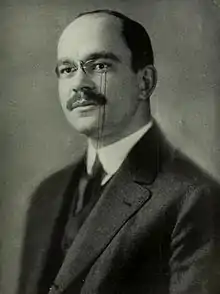John Jacob Rogers
John Jacob Rogers (August 18, 1881 – March 28, 1925) was an American lawyer and politician who served seven terms as a member of the United States House of Representatives from Massachusetts from 1913 until his death in office in 1925.
John Jacob Rogers | |
|---|---|
 | |
| Member of the U.S. House of Representatives from Massachusetts's 5th district | |
| In office March 4, 1913 – March 28, 1925 | |
| Preceded by | Butler Ames |
| Succeeded by | Edith Nourse Rogers |
| Personal details | |
| Born | August 18, 1881 Lowell, Massachusetts, U.S. |
| Died | March 28, 1925 (aged 43) Washington, D.C., U.S. |
| Political party | Republican |
| Spouse | |
| Profession | Attorney |
| Military service | |
| Branch/service | United States Army |
| Years of service | September 12, 1918 – November 29, 1918 |
| Rank | Private |
| Commands | Twenty-ninth Training Battery, Tenth Training Battalion, Field Artillery, Fourth Central Officers’ Training School |
| Battles/wars | World War I |
His wife, Edith Nourse Rogers, succeeded him in Congress and served for 35 years.
Early life and education
Rogers was born in Lowell, Massachusetts, and graduated from Harvard University in 1904 and from Harvard Law School in 1907. He practiced law in Lowell, starting in 1908.
Career
Rogers was a member of the Lowell city government in 1911 and school commissioner in 1912.
Congress
He was elected as a Republican to the Sixty-third and to the six succeeding Congresses and served from March 4, 1913, until his death.
World War I
During the First World War, Rogers enlisted on September 12, 1918, as a private with the Twenty-ninth Training Battery, Tenth Training Battalion, Field Artillery, Fourth Central Officers’ Training School, and served until honorably discharged on November 29, 1918.
Foreign Service Act
Rogers is remembered as "The father of the Foreign Service" due to his sponsorship of the 1924 Foreign Service Act, also known as the Rogers Act.[1]
Death
Rogers died in Washington, D.C., of appendicitis[2] on March 28, 1925, and was interred at Lowell Cemetery in Lowell, Massachusetts.
Family
His wife, Edith Nourse Rogers, who would end up being the longest serving female of Congress for over 60 years, succeeded him in Congress.
.jpg.webp)
References
- "In the Beginning: The Rogers Act of 1924". American Foreign Service Association. Retrieved 2016-09-06.
- "From Lowell Doughboys: John Jacob Rogers". Lowell Historical Society. Archived from the original on 2017-03-05. Retrieved 2016-09-10.
- United States Congress. "John Jacob Rogers (id: R000400)". Biographical Directory of the United States Congress.

